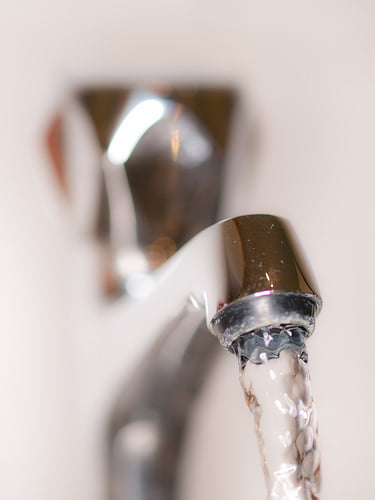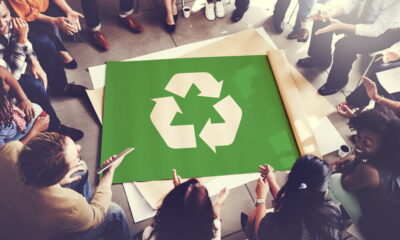

Features
The Green Doctors: making the world more sustainable
A ‘Green Doctor’ might sound like someone who nurtures shrubbery back to full health, but in reality, it’s a project driven by sustainability ethics. Anna Duggal took a look into it.
In the UK, a shocking 3.4 billion litres of water are wasted by the water industry every day, making it a valuable commodity being carelessly exhausted.
A ‘Green Doctor’ might sound like someone who nurtures shrubbery back to full health, but in reality, it’s a project driven by sustainability ethics. Anna Duggal took a look into it.
In the UK, a shocking 3.4 billion litres of water are wasted by the water industry every day, making it a valuable commodity being carelessly exhausted.
Amazingly, Syria and Sudan – countries of mainly desert – have more water available per head than the South East of England, so says the Environment Agency.
In a bid to decelerate our water wastage, amongst other things, a UK charity is taking matters into its own hands.
Groundwork has many initiatives available throughout the country to promote community work, help young people with skills training and employability, and encourage a greener way of life.
Through its Green Doctor project, it specialises in advising and equipping households with all they need to improve and reduce their use of energy and water, therefore lowering their bills.
The specialists offer home visits and workshops for groups of residents to advise them how to run their home more sustainably, and ultimately, more economically.
The first Groundwork project began in the recession of the 1980s, with the backing of then environmental secretary Michael Heseltine. It was so successful that it was developed and duplicated across the country.
As the charity has grown, its work has involved more schemes, with each trust having a specific area to focus upon.
The Green Doctor programme operates across the country, including cities such as London, Leeds, Cheshire, Sheffield and Southampton. In the South East, a Green Doctor programme is being delivered in collaboration with Southern Water – where advice is given specifically about saving water, energy and money.
Southern Water has set up a Universal Metering Programme. As the region has been classed by Defra – the Department for Environment, Food and and Rural Affairs – as an area of ‘serious water stress’, Southern Water will introduce water meters for 92% of its customers, based on the knowledge that people on a water meter tend to use 10% less water.
Katie Pereira, Groundwork UK project officer, described its work in the region, saying, “This programme will create an opportunity for over 55,000 customers across the South East to have a Green Doctor visit, with free water efficiency devices and sign-posting to the support available from agencies such as the Energy Saving Trust”.
The scheme has been proven successful with a trial on the Isle of Wight, in which meters were fitted in 93% of properties on the island. The customers now use a more sustainable 122 litres of water per person, per day compared to the average which is 173 litres. You can calculate your own, or your family’s usage with this Water Calculator on the BBC website.
Pereira continued, “At Groundwork, we want to help people to live and work in a cleaner and greener way.
“Southern Water wants to help its customers reduce their water and energy consumption to help create a sustainable future. This programme makes for a natural fit.”
Saving water can also save energy – taps, baths and showers contribute around 30% of the household’s average energy bill, which is around £200 a year.
The Green Doctor project has already drawn plaudits for its work. The Calderdale branch received a Yorkshire Post Environmental Award for its project, which focuses on tackling climate change.
With awareness growing on economic subjects throughout the country, we are now in charge of creating the outcome of our world.
Pereira concluded, “The aim has to be helping our communities to become more resilient against global economic and environmental events that are beyond their control”.
The Green Doctor project is helping this information filter to all types of households, so that we can all contribute our part towards saving the planet.
Especially for readers of Blue & Green Tomorrow, below are five easy and helpful tips for saving water, straight from the Green Doctor scheme:
Bath or shower?
A bath uses around 80 litres of water, whereas a water efficient shower only uses about 30 litres if you have a water saving, four minute shower – invest in an egg timer for your bathroom!
Cleaning your teeth
Turn the tap off while you brush your teeth and rinse at the end with a mug of water. A family of four can save a bathful of water every day by following this example.
Flushing the loo
Flushing the toilet accounts for about a third of all the water we use in our homes. You can install an easy to fit Save-a-flush bag or fit a modern dual flush toilet to reduce the amount of water you use.
Washing machines
Using an efficient machine, a full load a day uses nearly 22,000 litres a year and costs about £65 just for the water. An inefficient machine will use about 10,000 litres more per year and cost an extra £30.
Boiling the kettle
Filling the kettle to the brim wastes power as well as water – only boil as much water as you need for a cup of tea or coffee, but make sure the element is covered.
These measures are just a tiny proportion of what needs to be done to make our water usage more sustainable. Blue & Green Tomorrow would suggest that in order to make a sizeable print, investment in ethical funds, which in turn invest in water sustainability technologies, is imperative.
One such fund – the IM WHEB Sustainability fund – focuses on global water resource shortages as one of its three main themes.
Furthermore, converting your home to renewable energy will aid the UK’s sustainable progression. Look at Good Energy who will guide you through relevant ideas.


 Environment12 months ago
Environment12 months agoAre Polymer Banknotes: an Eco-Friendly Trend or a Groundswell?

 Features11 months ago
Features11 months agoEco-Friendly Cryptocurrencies: Sustainable Investment Choices

 Features12 months ago
Features12 months agoEco-Friendly Crypto Traders Must Find the Right Exchange

 Energy11 months ago
Energy11 months agoThe Growing Role of Solar Panels in Ireland’s Energy Future





























